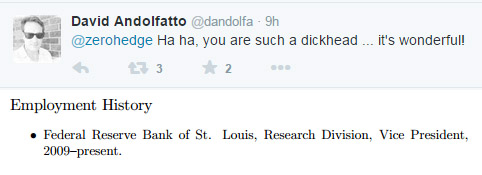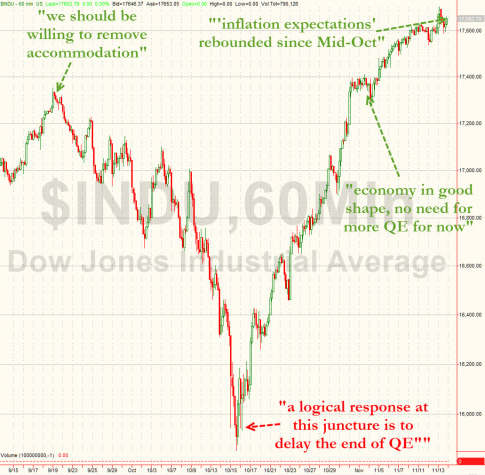– When Did “Dickhead” Become Part Of Federal Reserve Jargon? (ZeroHedge, Nov 14, 2014):
Update:
Disappointed in my use of that language–term clearly better applied to myself! Wish to apologize to @zerohedge (views and opinions my own).
— David Andolfatto (@dandolfa) November 15, 2014
When in the course of human events, a simple tweet observing the farce that America’s centrally-planned economy and markets have become as a result of the relentless intervention of a few clueless economic hacks…
BULLARD: FED TO RAISE RATES IN 2015, TIMING DETERMINED BY DATA. Determined by DJIA he means
— zerohedge (@zerohedge) November 14, 2014
… Incites a response such as this by a taxpayer-funded peer of the abovementioned clueless economic hack, a peer who incidentally has never stepped a foot outside of academia in his entire “professional” career:
@zerohedge Ha ha, you are such a dickhead … it’s wonderful!
— David Andolfatto (@dandolfa) November 14, 2014
… a person who is a “Vice President” at the St. Louis Fed, the same Bank whose president is singlehandedly responsible for the last 10% upswing in these here rigged “markets”…
… who counts among his “academic credentials” the following:
Ph.D. Economics
University of Western Ontario
1994M.A. Economics
Simon Fraser University
1987B.B.A. Commerce
Simon Fraser University
1985… and who is the self-professed author of the following “research” papers:
Articles Published in Peer-Reviewed Journals
“Optimal Disclosure Policy and Undue Diligence”
with Aleksander Berentsen and Christopher J. Waller
Journal of Economic Theory, January 2014, 149, pp. 128-152.“Information Disclosure and Exchange Media”
with Fernando M. Martin
Review of Economic Dynamics, July 2013, 16(3), pp. 527-539.“Incentive-Feasible Deflation”
Journal of Monetary Economics, May 2013, 60(4), pp. 383-390.“A Note on the Societal Benefits of Illiquid Bonds”
Canadian Journal of Economics, February 2011, pp. 133-47.“Essential Interest-Bearing Money”
Journal of Economic Theory, July 2010, 145(4), pp. 1319-602.“Money, Intermediation, and Banking”
with Ed Nosal
Journal of Monetary Economics, April 2009, 56(3), pp. 289-94.“Rational Truth-Avoidance and Self-Esteem”
with Steeve Mongrain and Gordon Myers
Canadian Journal of Economics, February 2009, 42(1) pp. 141-54.“Endogenous Debt Constraints in a Life-Cycle Model with an Application to Social Security”
with Martin Gervais
Journal of Economic Dynamics and Control, December 2008, 32(12), pp. 3745-59.“Bank Incentives, Contract Design, and Bank-Runs”
with Ed Nosal
Journal of Economic Theory, September 2008, 142(1), pp. 28-47.Federal Reserve Bank of St. Louis Publications
“Liquidity Shocks, Real Interest Rates, and Global Imbalances”
Federal Reserve Bank of St. Louis Review, May/June 2012, 94(3), pp. 187-195.“Fiscal Multipliers in War and in Peace”
Federal Reserve Bank of St. Louis Review, March/April 2010, 92(2), pp. 121-27.Other Federal Reserve Publications
“A Simple Model of Money and Banking”
with Ed Nosal
Federal Reserve Bank of Cleveland Economic Review, 2001, 37(3), pp. 20-28.“Unemployment and Economic Welfare”
with Paul Gomme
Federal Reserve Bank of Cleveland Economic Review, 1998, 34(3), pp. 25-34.Other Publications, Book Reviews and Edited Volumes
“Search Models of Unemployment”
in Steven N. Durlauf and Lawrence E. Blume, eds., The New Palgrave Dictionary of Economics, 2nd Edition, 2008, Palgrave Macmillan.“Comment on ‘The Expectation Trap Hypothesis’ by Lawrence J. Christiano and Christopher Gust”
Proceedings of the Bank of Canada Conference on Money, Monetary Policy and Transmission Mechanisms, October 2000, pp. 394-402.“Unemployment Insurance and Labor-Market Activity in Canada”
with Paul Gomme
Carnegie-Rochester Conference on Public Policy, June 1996, 44, pp. 47-82.… It becomes all too clear why the centrally-planned states of America are so very fucked up.
And while we appreciate the understanding that Fed “professionals” spend their working “research” hours tweeting instead of actually, you know, “researching” one can’t help but wonder what follows after ad hominem?
Finally, while we don’t know if “dickhead” is a generally-accepted term of the central-planner’s jargon, we do know that the last time we were graced with its “dickweed” derivative, the outcome was delightfully ironic for (almost) everyone.

